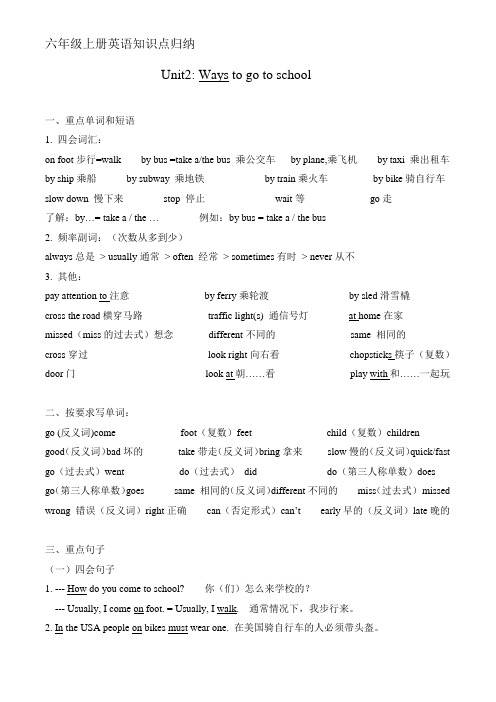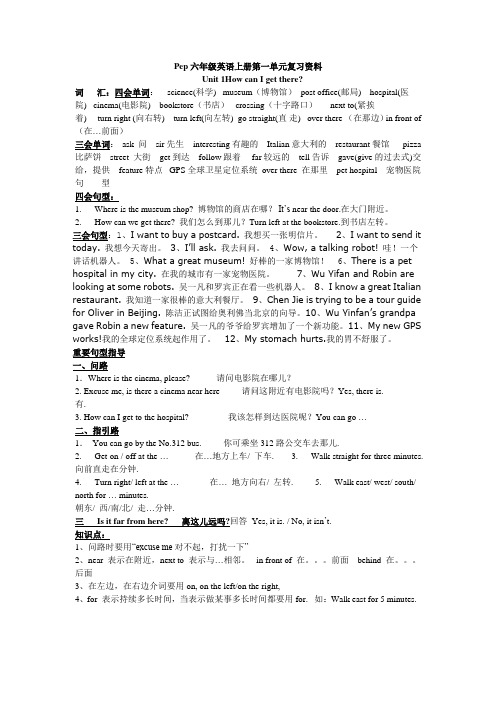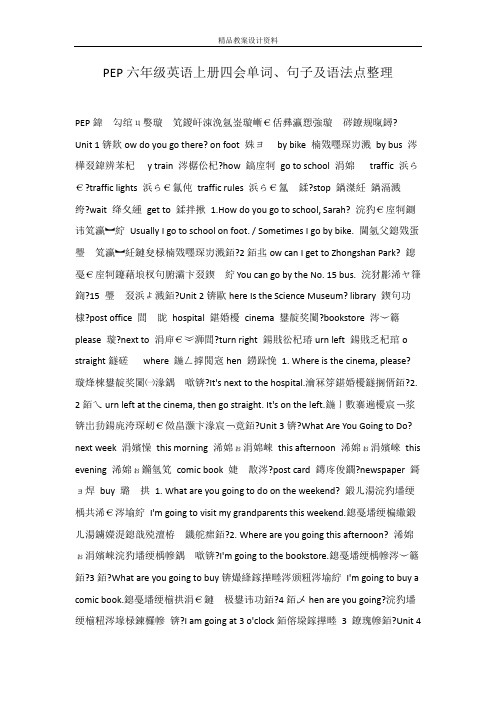PEP六年级上册四会单词词汇表
Unit1(知识清单)(教师版)六年级英语上册高效课堂系列(人教PEP版)

【知识清单】人教PEP版英语六年级上册第一单元(教师版)第一单元How can I get there?一、“四会”词汇(听、说、读、写)science科学museum博物馆post office邮局bookstore 书店cinema电影院hospital医院crossing十字路口turn转弯left 左straight 笔直的right右二、其他词汇(认读)ask问sir先生interesting有趣的Italian意大利的restaurant餐馆pizza披萨饼street街道get到达BDS北斗卫星导航系统gave(give的过去式)提供;交给feature特点follow跟着far远的tell告诉三、短语:science museum科学博物馆post office邮局turn left向左转turn right向右转go straight直走Italian restaurant意大利餐馆in front of在......前面next to紧挨着四、句型1.Where is the cinema?电影院在哪里?2. It’s next to the bookstore. 它紧挨着书店。
3. I want to buy a postcard.我想买一张明信片。
4.Excuse me, sir.打扰一下,先生。
5.There is a pet hospital in my city.在我的城市有一个宠物医院。
6.What an interesting film!多么有趣的电影啊!7.It’s next to the park on Dongfang Street. 它在东方大街上紧挨着公园。
8.How can we get there?我们如何到达那里?9.Turn left at the bookstore.在书店左转。
10.Is it far?远吗?知识点01:询问位置:-Where is...?-It’s near/next to/in front of/behind... 【语法解析】1.对地点提问用where(哪里)。
pep英语六年级上册Unit 3四会单词及句子

Unit 3next week 下周[nekst] [wi:k] this morning 今天上午[ðis]['mɔ:niŋ]this afternoon 今天下午[ˌɑ:ftə'nu:n]this evening 今天晚上['i:vniŋ] tonight今晚[tə'nait]tomorrow明天[tə'mɔrəu]take a trip去旅行[teik] [trɪp] read a magazine阅读杂志[ri:d] [,mægə'zi:n][ðə] [greit] [wɔ:l]go to the cinema 去看电影['sinimə] theme park 主题公园[θi:m] [pɑ:k] the Great Wall长城busy忙碌的together一起地[tə'geðə] comic book 漫画书['kɔmik] post card 明信片[post] [kɑrd]newspaper 报纸['nju:z,peipə]magazine杂志[,mægə'zi:n] dictionary词典;字典['dikʃənəri]shoe store鞋店[ʃu:] [stɔ:] buy 购买[bai]fruit stand水果摊[fru:t] [stænd]pet shop宠物商店[pet] [ʃɔp] need需要[nid]plant植物[plænt]else其他;另外[els]shop商店[ʃɔp]句子:What are you going to do on the weekend?周末你打算干什么?I’m going to visit my grandparents this weekend.这个周末我打算拜访我的祖父母。
(完整版)PEP六年级上册英语第2单元知识点

Unit2: Ways to go to school一、重点单词和短语1. 四会词汇:on foot步行=walk by bus =take a/the bus 乘公交车by plane,乘飞机by taxi 乘出租车by ship乘船by subway 乘地铁by train乘火车by bike骑自行车slow down 慢下来stop 停止wait等go走了解:by…= take a / the …例如:by bus = take a / the bus2. 频率副词:(次数从多到少)always总是> usually通常> often 经常> sometimes有时> never从不3. 其他:pay attention to注意by ferry乘轮渡by sled滑雪橇cross the road横穿马路traffic light(s) 通信号灯at home在家missed(miss的过去式)想念different不同的same 相同的cross穿过look right向右看chopsticks筷子(复数)door门look at朝……看play with和……一起玩二、按要求写单词:go (反义词)come foot(复数)feet child(复数)childrengood(反义词)bad坏的take带走(反义词)bring拿来slow慢的(反义词)quick/fast go(过去式)went do(过去式)did do(第三人称单数)doesgo(第三人称单数)goes same 相同的(反义词)different不同的miss(过去式)missed wrong 错误(反义词)right正确can(否定形式)can’t early早的(反义词)late晚的三、重点句子(一)四会句子1. --- How do you come to school? 你(们)怎么来学校的?--- Usually, I come on foot. = Usually, I walk. 通常情况下,我步行来。
Pep小学英语六年级上册Unit4考点梳理

第四单元考点梳理
一、我学会的单词有:
四会单词:studies (study的第三人称单数形式) puzzle 谜hiking 远足三会单词:hobby 业余爱好jasmine 茉莉idea 想法;主意Canberra 堪培拉(澳大利亚首都)amazing 令人惊奇的
shall 表示征求意见goal 射门;目标join 加入
club 俱乐部share 分享
二、我学会的短语有:
pen pal 笔友read stories 读故事play football 踢足球
do kung fu 练武术cook Chinese food 做中国食物
study Chinese 学习汉语do word puzzles 猜字谜go hiking 去远足
三、我学会的句型有:
1.What are Peter’s hobbies? 彼得有什么爱好?
2.He likes reading stories. 他喜欢读故事。
3.–Does he live in Sydney? 他住在悉尼吗?
--No, he doesn’t. 不,他没有。
4. –Does he like doing word puzzles and going hiking? 他喜欢猜字谜和远足吗?
--Yes, he does. 是的,他喜欢。
pep六年级英语上册第一单元复习资料

Pep六年级英语上册第一单元复习资料Unit 1How can I get there?词汇:四会单词:science(科学) museum(博物馆)post office(邮局) hospital(医院) cinema(电影院) bookstore(书店)crossing(十字路口) next to(紧挨着) turn right (向右转) turn left(向左转) go straight(直走) over there (在那边)in front of (在…前面)三会单词:ask 问sir先生 interesting有趣的 Italian意大利的 restaurant餐馆 pizza 比萨饼 street 大街get到达 follow跟着 far较远的 tell告诉 gave(give的过去式)交给,提供 feature特点 GPS全球卫星定位系统over there 在那里pet hospital 宠物医院句型四会句型:1. Where is the museum shop? 博物馆的商店在哪?It’s near the door.在大门附近。
2. How can we get there? 我们怎么到那儿?Turn left at the bookstore.到书店左转。
三会句型:1、I want to buy a postcard. 我想买一张明信片。
2、I want to send it today. 我想今天寄出。
3、I’ll ask.我去问问。
4、Wow, a talking robot! 哇!一个讲话机器人。
5、What a great museum! 好棒的一家博物馆! 6、There is a pet hospital in my city. 在我的城市有一家宠物医院。
7、Wu Yifan and Robin are looking at some robots. 吴一凡和罗宾正在看一些机器人。
六年级上册英语重点单词重点句子总复习

PEP六年级上册四会单词及句子复习Unit1第一单元四会单词:Sciencemuseum科学博物馆postoffice邮局bookstore书店cinema电影院hospital医院crossing十字路口turnleft向左转gostraight直走turnright向右转四会句子:1--Whereisthemuseumshop博物馆的商店在哪儿--It`snearthedoor在大门附近2--Howcanwegetthere我们怎么到那儿--Turnleftatthebookstore到书店左转Unit2第二单元四会单词:onfoot走路bybus乘公共汽车bytaxi乘出租车byplane乘飞机bysubway乘地铁byship乘船bytrain乘火车slowdown减速stop停下wait等go走四会句子:1--Howdoyoucometoschool你怎么来学校的--Usually,Icomeonfoot通常我走路来2IntheUSApeopleonbikesmustwearone.在美国骑自行车的人必须戴头盔;3 Don’tgoattheredlight别闯红灯;4Imustpayattentiontothetrafficlights我必须注意交通信号灯Unit3第三单元四会单词:visitmygrandparents拜访我的外祖父母seeafilm看电影takeatrip远行gotothesupermarket去超市dictionary词典comicbook连环画书wordbook单词书postcard明信片四会句子:1--Whatareyougoingtodotomorrow你明天打算做什么--I’mgoingtohaveanartlesson.我要上美术课2 We’regoingtodrawsomepicturesinRenminPark.我要到人民公园去画画3--Whereareyougoing你们打算去哪儿--We`regoingtothecinema我们打算去电影院4Whenareyougoing你们什么时候去Unit4第四单元四会单词:dancing跳舞singing唱歌readingstories看故事书playingfootball踢足球doingkungfu打功夫cooksChinesefood做中国菜studiesChinese学习汉语doeswordpuzzles猜字谜goeshiking远足四会句子:1--WhatarePeter`shobbies彼得有什么爱好--Helikesreadingstories他喜欢读故事2--DoesheliveinSydney他住在悉尼吗--No,hedoesn`t不,他没有3--Doeshelikedoingwordpuzzlesandgoinghiking他喜欢猜字谜和远足吗--Yes,hedoes是的,他喜欢Unit5第五单元四会单词:factoryworker工厂工人postman邮递员businessman生意人policeofficer警察fisherman渔民scientist科学家pilot飞行员coach教练四会句子:1--Whatdoeshedo他是做什么的--Heisabusinessman.他是商人2--Wheredoeshework他在哪儿工作--Heworksatsea.他在海上工作;3--Howdoeshegotowork他怎么上班--Hegoestoworkbybike.他骑自行车上班;Unit6第六单元四会单词:angry生气的afraid害怕的sad悲伤地worried担心的happy开心的seeadoctor看医生domoreexercise做更多的锻炼takeadeepbreath深深吸一口气wearwarmclothes穿暖和的衣服counttoten数到十四会句子:1 They’reafraidofhim.它们害怕它2Thecatisangrywiththem.这只猫生它们的气;3What`swrong怎么了Yourfatherisill.你爸爸生病了;4Heshouldseeadoctorhismorning.他今天早上应该去看病;5Don`tbesad.别伤心PEP六年级上册常用句型问路和指路-Whereis+地点名词……在哪儿-It’s+介词短语.在……;-Howcanwe/Igetto...我们/我怎么到……呢-Turnleft/right./Gostraight./Youcangoby+交通工具.左/右转;直走;/你可以乘坐……去那儿;询问并回答对方来或去某地的交通方式:Howdoyoucome/goto+地点你/你们怎么来/去……I/Wecome/goto+地点+bybike/onfoot….我/我们骑自行车/步行……来/去……询问对方某个时间打算做某事的句型及答语:-Whatareyougoingtodo+表示将来的时间你……打算去做什么-I’mgoingto+动词原形+将来的时间.我打算……去做……询问对方打算去哪儿的句型及答语:Whereareyougoing+表示将来的时间你……打算去哪儿I’mgoingto+表示地点的名词.我打算……去….询问对方打算什么时候去做某事的句型及答语:Whenareyougoing+动词原形你打算什么时候去……Iamgoingto+动词原形+将来时间.我打算……去……;注:begoingto+动词原形=will+动词原形询问别人的爱好并作出回答:Whatis/are某人的hobby/hobbies……有什么爱好=Whatdo/does某人like主语+like/likes+动词-ing+其他.……喜欢做……=某人的hobby is/are….某人的爱好是...;助动词does引导的一般疑问句及答语:Does+第三人称单数主语+动词原形+其他……做……吗-Yes,he/she/itdoes.No,he/she/itdoesn’t.是的,他/她/它是;不,他/她/它不是;询问他人的职业并作出回答:Whatdo/does+主语+do......是做什么的=Whatbe+某人主语+be动词+a/an+职业名词.……是……询问他人的工作地点并作出回答:Wheredo/does+主语+work……在哪儿工作主语+work/works+表示地点的副词或介词短语;……在……工作;询问他人怎么去上班:Howdo/does+主语+gotowork主语+gotowork+bybike/onfoot….询问他人正在做什么及描述正在做某事:What+be+某人+doing主语+be动词+动词-ing+其他….正在…Don’t祈使句:Don’t+动词原形+其他.不要……Don’t+be+形容词+其他.不要……表达对某人或某事的关心:What’wrongwith+某人描述及提问某人的感受的句型:How+do/does某人+feel主语+feel/feels+表示感受的形容词+其他.=主语+be动词+表示感受的形容词+其他.……是……用should来给对方提建议及征求意见的句型:Whatshould某人+do某人should+动词原形.你应该…..语法复习一、现在进行时态3种变化规律1.直接加ing:do—doing draw—drawing cook—cooking answer—answering read—reading listen—listening fly—flying sing—singing play—playing2.去掉末尾的e加ing:write—writing dance—dancing take—taking have—having make—making ride—riding dive—diving3.双写末尾字母加ing:get—getting run—running swim—swimming sit—sitting put—putting你正在干什么WhatareyoudoingI’mansweringthephone.他/她/它正在干什么Whatishe/she/itdoingHe’s/She’s/It’s …他她、它们正在干什么WhataretheydoingTheyare…看到like或likes后面的动词要加上ing二、一般将来时态begoingto/will+动词原形表示一般将来时的时间状语有:thismorning,thisafternoon,thisevening,tomorrow,tonight,thisweekend,ontheweekend,nextweek,nextmonth,nextyear,nextweekend.例:今晚你将要做什么Whatareyougoingtodothisevening—I’mgoingtothecinema.I’mgoingtovisitmygrandparents.你将什么时候去Whenareyougoing—I’mgoingat7:10.你将怎样去呢Howareyougoing—I’mgoingbybus.今天下午你将要去哪里Whereareyougoingthisafternoon—I’mgoingtothebookstore.你将要买什么呢WhatareyougoingtobuyI’mgoingtobuyacomicbook.你将和谁一起去WhoareyougoingwithI’mgoingwithmyparents.三、第三人称单数后面的动词要加s或es1.一般情况加s,如:read—reads;live—lives;play—plays;sing—sings2.动词末尾以s,x,ch,sh或部分以o结尾的加es记住课本中出现的这几个:watches,teaches,goes,does,washes,passes3.辅音字母+y结尾的把y变i再加es,如:fly—flies;study—studies4.特殊情况:have--has5.第三人称单数包括:he;she;it;myfather/friend;Amy/Hangzhou等一个人名或地名;例如:Helikesdrawingpictures.Sheworksinacarcompany.Itcomesfromtheclouds.Myfathergoestoworkonfoot.LiLeioftenplayscomputergamesafterlunch.6.一般疑问句记住:前面助动词加了es,后面动词就不变化了;如:DoessheteachEnglishDoesyourpenpalliveinHangzhou四、不定冠词a和an的用法a用于辅音因素开头的单词前;an用于元音因素开头的单词前;记住课本中出现的要用an的单词:anactor;anactress;anartist;anengineer;anaccountant;anEnglishbook;anorange;anapple;anoldwoman五、动词变化为表示职业或人的单词1.动词后面加er:work—worker;teach—teacher;sing—singer;TV report—TVreporterclean—cleaner2.动词后面加or:act—actor;doctor3.末尾以e结尾的直接加r:write—writer;dance—dancer;drive—driver4.动词后面加ist:art—artist;tour—tourist5.职业男女有区别的:警察policeman—policewoman;演员actor—actress六、8个疑问词which哪一个what什么when什么时候where哪里whose谁的why为什么how怎么样who谁七、人称代词和物主代词I—my-mine我—我的-我的you—your-yours你;你们—你的;你们的-你的;你们的he—his-his他—他的-他的she—her-hers她—她的-她的we—our-ours我们—我们的-我们的they—their-theirs他们/她们/它们—他们的/她们的/它们的他们的/她们的/它们的八、can后面加动词原形WhatcanyoudoIcancookthemeals.Hecanflykites.Shecan playtheviolin.弹小提琴PEP小学英语六年级上册各单元作文一、介绍你和家人上学或上班的方式Igotoschoolonfoot.Mysistergoestoschoolonfoot,too.Mybrothergoestoschoolby bike.Myfathergoestoworkbycar.Mymothergoestoworkbybike.二、看图,说说你怎样去电影院Igotothecinema.Istartfromhere.Gostraightforfiveminutes.Thenturnleftatthe library.Gostraightforoneminute.Thelibraryisontheright.三、读读下周末你和朋友的计划I’mgoingtohaveabusyweekendwithmyfriends.OnSaturdaymorning,wearegoingtog oshpping.OnSaturdayafternoon,wearegoingtothepark.OnSundaymorning,wearego ingtogofishing.OnSundayafternoon,wearegoingtoflykites.Wewillbehappy.四、说说你和你家人的爱好;Ilikeflyingkites.Myfatherlikesdiving.Mymotherlikesplayingthepipa.Mybroth erlikesridingabike.Mysisterlikeslisteningtomusic.MyfriendJohnlikesflying kites.Amylikescollectingstamps.ZhangPenglikesplayingfootball.ChenJielike sridingabike.五、介绍你一家人的职业和上班地点和方式;Myfatherisateacher.Heworksinaschool.Hegoestoworkbycar.Mymotherisanaccoun tant.Sheworksinabank.Shegoestoworkbybus.六、写一封信给你的笔友,介绍你一家人的情况;DearAmy,MynameisSarah.I’m13.I’mtallandthin.Ilikeswimming.Myfatheris40.He’stal landstrong.Helikesreadingbooks.Heisworker.Heworksinafactory.Hegoestowork bycar.M ymotheris39.She’sshortandthin.Shelikescooking.Sheworksinabooksto re.Shegoestoworkonfoot.Yours,Sarah七、看图介绍图中这个人的情况;HeisBen.Heis26.Heisapoliceman.Hegoestowork bybus.Helikesplayingtheviolin.Helikesgoingfishing,too.。
(Unit 1)小学英语人教版PEP六年级上册知识汇总

Unit1四会词(会听说读写)考查形式:听力或笔试补全单词题PA science museum科学博物馆post office邮局bookstore书店cinema电影院hospital医院PB crossing十字路口turn left左转go straight直走turn right右转三会词(会听说读)考查形式:笔试第一大题选择不同类(同类)一项postcard 明信片send寄(信)excuse me打扰一下pet hospital宠物医院interesting有趣的film电影Italian意大利的restaurant餐馆map地图compass指南针BDS北斗导航star星星give给feature功能follow me跟着我work奏效far较远的tell告诉ask询问旧词next to紧邻near在旁边beside在旁边behind在后面between在中间in front of在前面library图书馆--It's next to the bookstore.(电影院)在图书馆旁边。
--Where is the museum shop?博物馆商店在哪里?--It’s near the door.(博物馆商店)在大门旁边。
I want to buy a postcard.我想要买一张明信片。
What a great museum!多棒的一个博物馆呀!What an interesting film!多么有趣的一部电影呀!I know a great Italian restaurant.我知道一间很棒的意大利餐馆。
It's next to the park on Dongfang Street.它在东方街上的公园旁边。
How can we get there?我们怎么到那儿呢?How can we get to the library?我们怎么到达图书馆呢Turn left at the bookstore.Then turn right at the hospital.到书店左转。
PEP六年级英语上册四会单词、句子及语法点整理

PEP六年级英语上册四会单词、句子及语法点整理PEPц?Unit 1锛欻ow do you go there? on foot by bike 楠戣嚜琛岃溅by bus 涔y train 涔樼伀杞?how 鎬庢牱go to school traffic 浜ら€?traffic lights 浜ら€氱伅traffic rules ?stop 鍋滐紝鍋滆溅绔?wait 绛夊緟get to 鍒拌揪 1.How do you go to school, Sarah? 浣犳€庢牱鍘讳笂瀛︼紵Usually I go to school on foot. / Sometimes I go by bike. 閫氬父鎴戣蛋?2銆丠ow can I get to Zhongshan Park? 鎴You can go by the No. 15 bus. 浣犲彲浠ヤ箻鍧?15 ?Unit 2锛歐here Is the Science Museum? library 鍥句功棣?post office hospital 鍖婚櫌cinema 鐢靛奖闄?bookstore 涔﹀簵please 璇?next to 涓庘€︾浉閭?turn right 鍚戝彸杞瑃urn left 鍚戝乏杞琯o straight where 鍦ㄥ摢閲宼hen 鐒跺悗1. Where is the cinema, please??It's next to the hospital.瀹冧笌鍖婚櫌鐩搁偦銆?2. 2銆乀urn left at the cinema, then go straight. It's on the left.鍦ㄧ數褰遍櫌宸﹁浆锛岀劧鍚庣洿琛屻€傚畠灏卞湪宸﹁竟銆?Unit 3锛?What Are You Going to Do? next week 涓嬪懆this morning 浠婂ぉ涓婂崍this afternoon 浠婂ぉ涓嬪崍this evening 浠婂ぉ鏅氫笂comic book ?post card 鏄庝俊鐗?newspaper 鎶ョ焊buy 1. What are you going to do on the weekend? 鍛ㄦ湯浣犳墦绠楀共浠€涔堬紵I'm going to visit my grandparents this weekend.鎴戞墦绠楄繖鍛?2. Where are you going this afternoon? 浠婂?I'm going to the bookstore.鎴戞墦绠楀幓涔﹀簵銆?3銆?What are you going to buy锛熶綘鎵撶畻涔颁粈涔堬紵I'm going to buy a comic book.?4銆乄hen are you going?浣犳墦绠椾粈涔堟椂鍊欏幓锛?I am going at 3 o'clock銆傛垜鎵撶畻 3 鐐瑰幓銆?Unit 4锛?I Have a Pen Pal hobby 鐖卞ソride a bike--riding a bike 楠戣嚜琛岃溅dive--diving 璺虫按play the violin鈥昿laying the violin 鎷夊皬鎻愮惔make kites 鈥昺aking kites 鍒朵綔椋庣瓭collect stamps鈥昪ollecting stamps 闆嗛偖live 锟紺lives 灞呬綇teach--teaches 鏁?go--goes 鍘?watch--watches 鐪?read--reads 璇伙紝鐪?does doesn鈥檛=does not 1. What's your hobby?涔堬紵I like collecting stamps.?2銆丠e likes collecting stamps, too. ?3銆丏oes she teach math? --- Yes, she does.?Does she teach English?-- No, she doesn't.涓嶏紝濂逛笉鏁欍€?She teaches math.?Unit 5锛?What Does She Do? singer 姝屽敱瀹讹紝姝屾墜writer actor 鐢锋紨鍛?actress 濂虫紨鍛?artist TV reporter ?engineer 宸ョ▼甯?accountant policeman ?salesperson cleaner 娓呮磥宸?where 鍦ㄥ摢閲岋紝鍒板摢閲?work 宸ヤ綔 1.What does your mother do? What si your mother??She is a TV reporter.濂规槸涓€浣嶇數瑙嗗彴璁拌€呫€?2銆乄hat does your father do? 浣犵埜鐖告槸骞蹭粈涔堢殑锛烪e is an accountant.浠栨槸涓€浣嶄細璁°€?3銆乄here does she work? ?She works in a car company.濂瑰湪灏忔苯杞﹀叕鍙稿伐浣溿€?4銆丠ow does she go to work? She goes to work by bus.?Unit 6锛?The Story of Rain rain 闆?cloud 浜?sun stream 娌筹紝婧?come from 鏉ヨ嚜锛?浠庘€︽潵seed 绉嶅瓙soil 鍦熷¥sprout 鑻楋紝鑺?plant 妞嶇墿锛?should 搴then 鐒跺悗1. Where does the rain come from? --- It comes from the clouds.?2銆乄here does the cloud come from? 浜--- It comes from the vapour.?3銆乄here does the vapour come from? --- It comes from the water in the river.?4銆丠ow can the water become vapour?姘存€庢牱鍙樻垚姘磋捀姘旓紵--- The sun shines and the waterbecomes vapour.闃冲厜鐓ц€€锛屾按鍙樻垚钂告皵銆?5.銆丠ow do you do that? 浣犳€庢牱鍋氬憿? 6銆?What should you do then?鐒跺悗浣犲簲璇ュ共浠€涔堬紵鍔ㄨ瘝鍙樺寲褰㈠紡锛?鍔ㄨ瘝鐨勭幇鍦ㄥ垎璇嶏紝鐢ㄤ簬鐜板湪杩О+be(am is are)+1ng: reading flying looking cooking eating鈥?2銆佸姩璇嶆湯灏炬槸涓嶅彂闊崇殑e,鍘绘帀e,鍐嶅姞ing: take-taking come-coming ride-ridinghave-having make-making 鈥?3ing:run-running sit-sitting put-putting begin-beginning swimming鈥?渚嬶細I am reading a comic book. 鍚屾椂鍔ㄨ瘝鐜板湪鍒嗚瘝缁撴瀯杩樺彲浠ョ敤浜巐ike/enjoy I like swimming./I enjoy swimming.绉板崟鏁板舰寮忥紝鐢ㄤ簬always,often,usually,sometimes every dayО1銆佸姩璇嶆湯灏惧姞s: says asks sings answers looks makes鈥?2銆佷互s銆亁銆乧h 銆乻h缁撳熬鐨勫姩璇嶅姞es: teaches brushes鈥?3銆佷互杈呴煶瀛楁瘝+y缁撳熬鐨勶紝鍘粂鍙榠,鍐嶅姞es: fly-flies try-tries鈥?4.es锛?go-goes do-does have-has he has a book. 鐗规畩鐤戦棶鍙??璇㈤棶骞撮緞锛岀敤how old How old is Jenny? She is eleven. 璇㈤棶棰滆壊锛岀敤what colour What colour is your hair? It鈥檚black. 璇㈤棶浠锋牸锛岀敤how much How much is a stamp? 2 yuan. 璇㈤棶琛屼负鏂瑰紡锛岀敤how How do you go to school? By bus. 璇㈤棶鏁伴噺锛岀敤how many How many books do you have? I have twelve books. 璇㈤棶鏃堕棿锛岀敤when When is Teacher鈥檚Day?It鈥檚September tenth. 璇㈤棶鍏蜂綋鏃跺埢锛岀敤what time What timeis it now? It鈥檚6:30. 璇㈤棶鍦版柟锛岀敤where Where is the book? It鈥檚on the desk. 璇㈤棶浜猴紝鐢╳ho Who is she ?She is my sister. /灞?澶?..锛夛紝鐢╳hich Which season do you like ?I like summer. 璇㈤棶鑱屼笟锛岀敤what What do you do?I am a teacher. What are you?I am a teacher. 璇㈤棶鐖卞ソ锛岀敤what What is your hobby?I like swimming./My hobby is swimming. What do you like to do?I like swimming. 鏃舵€侊細1. (琛ㄧ粡甯革? 锛?锛?be鍔ㄨ瘝鐨勫彞瀛?I am a girl.(鑲? Are you a girl锛焂es,I am./No,I am not.() What is she锛?鐗规畩鐤戦棶鍙?She is a teacher./She is not a student.(鍚? 锛?锛?瀹炰箟鍔ㄨ瘝鐨勫彞瀛?A锛彞鍊熷姪鍔╁姩璇峝o I often read comic books and clean the room on Saturday.锛堣偗锛?I do not (don鈥檛) read comic books and clean the room on Sunday.(鍚? Do you often read comic books and clean the room on Saturday?Yes, I do./No,I don鈥檛.() What do you often do on Saturday?(鐗规畩鐤戦棶鍙? B:浜虹О紡锛屽湪鐤戦棶鍙ュ拰鍚﹀畾鍙ヤ腑鍔╁姩璇嶇敤does锛屽疄涔夊姩璇嶅彉涓哄師褰?She often reads comic books and clean the room on Saturday.锛堣偗锛?She does not (doesn鈥檛) read comic books and clean the room on Sunday.(鍚? Does she often read comic books and clean the room on Saturday?Yes, she does./No,she doesn鈥檛.() What does she often do on Saturday?(鐗规畩鐤戦棶鍙? 2. 為檯杩樻病鍋氾級閫氬父浼氭湁琛ㄥ皢鏉ョ殑鏃堕棿缁撴瀯锛氫汉绉?be锛坅m/is/are锛塯oing to +鍔ㄨ瘝鍘熷舰+鏃堕棿锛堣〃鎵撶畻锛?My mother is going to clean the room this weekend.(鑲? My mother is not going to clean the room this weekend.(鍚? Is your mother going to clean the room this weekend?Yes,she is ./No,she isn鈥檛.(涓) What is your mother going to do this weekend?(鐗规畩鐤戦棶鍙?3. 缁撴瀯锛氫汉绉?be锛坅m/is/are锛?鍔ㄨ瘝鍒嗚瘝缁撴瀯+(now) My uncle is making kites now.(鑲? My uncle is not making kites now.(鍚? Is your uncle is making kites now?Yes,he is./No,he isn鈥檛.( ) What is your uncle doing now?(鐗规畩鐤戦棶鍙?4. 鎯呮€佸姩璇峜an I can swim.(鑲? I can not swim.(鍚? Can you swim?Yes,I can./No,I can鈥檛.(涓€鑸) What can you do?(鐗规畩鐤戦棶鍙?。
- 1、下载文档前请自行甄别文档内容的完整性,平台不提供额外的编辑、内容补充、找答案等附加服务。
- 2、"仅部分预览"的文档,不可在线预览部分如存在完整性等问题,可反馈申请退款(可完整预览的文档不适用该条件!)。
- 3、如文档侵犯您的权益,请联系客服反馈,我们会尽快为您处理(人工客服工作时间:9:00-18:30)。
PEP六年级上册四会单词词汇表Unit 1by (经,乘) foot(脚) bike(自行车) bus(公共汽车) train(火车) how(怎样) go to school(上学)traffic(交通)traffic light(交通灯)traffic rule(交通规则)stop(停,停车站)wait(等待)get to(到达)Unit 2library(图书馆) post office(邮局) hospital(医院) cinema(电影院) bookstore(书店) where(在哪里,到哪里) please(请) next to(与…相邻) turn(转弯) right (右边) left(左边) straight(成直线地) then (然后)Unit 3next week(下周) this morning(今天上午) this afternoon(今天下午) this evening (今天晚上) comic book(漫画书) post card(明信片) newspaper(报纸) buy(购买)Unit 4hobby(爱好) ride a bike--riding a bike(骑自行车) dive--diving(跳水) play the violin—playing the violin(拉小提琴) make kites—making kites(制作风筝) collect stamps—collecting stamps(集邮) live –lives(居住) teach--teaches(教) go--goes(去) watch--watches(看) read--reads(读,看) does doesn’t=does notUnit 5singer(歌唱家,歌手) writer(作家) actor(男演员) actress(女演员) artist(画家) TV reporter(电视台记者) engineer(工程师) accountant(会计) policeman(男警察) salesperson(销售员) cleaner(清洁工) where(在哪里,到哪里)work(工作)Unit 6rain(雨) cloud (云) sun(太阳) stream(河,溪) come from(来自,从…来) seed(种子) soil(土壤) sprout (苗,芽) plant(植物,种植) should (应该) then(然后)PEP六年级下册四会单词词汇表Unit 1tall—taller更高的short—shorter 更矮的strong—stronger 更强壮的old—older 年龄更大的young—younger 更年轻的big—bigger 更大的heavy—heavier 更重的long—longer 更长的thin—thinner 更瘦的small—smaller (体型)更小的Unit 2have a fever 发烧have a sore throat喉咙疼have a cold感冒have a toothache 牙疼have a headache 头疼matter 事情,麻烦sore 疼的hurt疼痛nose 鼻子tired疲劳的,累的excited兴奋的angry生气的happy高兴的bored 无聊的,烦人的sad 忧伤的,悲伤的Unit 3watch—watched 看wash—washed 洗clean—cleaned打扫play—played玩visit—visited 看望do—did last weekend 上一个周末go—went去go to a park—went to a park 去公园go swimming—went swimming去游泳go fishing—went fishing去钓鱼read—read 读go hiking—went hiking 去郊游Unit 4leran Chinese—learned Chinese学汉语sing and dance—sang and danced 唱歌和跳舞eat good food—ate good food 吃好吃的食物take pictures—took pictures 照相climb—climbed 爬have—had buy presents—bought presents买礼物row a boat—rowed a boat 划船see elephant—saw elephant 看大象go skiing—went skiing 去滑雪go ice-skating—went ice-skating 去滑冰how怎么,如何get—got 到达last 上一个的。
小学英语词汇归类表(三年级上册----六年级下册)小学英语词汇归类表(三年级上册----六年级下册)一、学习用品(school things)pen(钢笔) pencil(铅笔) pencil-case(铅笔盒) ruler(尺子) book(书) post card(明信片) comic book(漫画书) bag(包) newspaper(报纸)schoolbag (书包) eraser(橡皮) crayon(蜡笔) sharpener(卷笔刀) story-book(故事书) notebook(笔记本) Chinese book(语文书) English book(英语书) math book(数学书) magazine(杂志) dictionary(字典,词典)二、人体(body)foot(脚) nose(鼻子)head(头) face(脸) hair(头发) mouth(嘴) eye(眼睛) ear(耳朵) arm(手臂) hand(手) finger(手指) leg(腿) tail(尾巴)三、颜色(colours)colour(颜色) red(红) blue(蓝)yellow(黄)green(绿)white(白)black(黑) pink(粉红) purple(紫) orange(橙) brown(棕)四、动物(animals)cat(猫)dog(狗)pig(猪)duck(鸭)rabbit(兔)horse(马)elephant(大象)fish(鱼) kangaroo(袋鼠)ant(蚂蚁) bird(鸟) eagle(鹰) beaver(海狸) snake(蛇) mouse(老鼠) squirrel(松鼠) monkey(猴) panda(熊猫) bear(熊) lion(狮子) tiger(老虎) fox(狐狸) zebra(斑马) deer(鹿) giraffe(长颈鹿) goose(鹅) hen(母鸡) turkey(火鸡) lamb(小羊) sheep(绵羊) goat(山羊) cow(奶牛) donkey(驴) squid(鱿鱼) lobster(龙虾) shark(鲨鱼) seal(海豹) sperm whale(抹香鲸) killer whale(虎鲸)五、人物(people)friend(朋友)boy(男孩)girl(女孩)mother(母亲)father(父亲)sister(姐妹) brother(兄弟)uncle(叔叔,舅舅)mom(妈妈)grandpa/ grandfather(祖父,外祖父)man(男人) woman(女人) Mr(先生) Miss(小姐) lady(女士,小姐) dad(爸爸) parents(父母) grandma/ grandmother(祖母,外祖母) aunt(姑姑) cousin(堂表兄弟,堂表姐妹) son(儿子) baby(婴儿) kid(小孩) classmate(同学) queen(女王) visitor(参观者) neighbour(邻居) principal(校长) university student(大学生) pen pal(笔友) tourist(旅行者) people(人物)robot(机器人)六、职业(jobs)teacher(教师)student(学生)doctor(医生)nurse(护士)driver(司机)farmer(农民)singer(歌唱家)writer(作家)actor(男演员)actress(女演员)artist(画家)TV reporter(电视台记者) engineer(工程师)accountant(会计)policeman(警察)salesperson(销售员)cleaner(清洁工)baseball player(棒球运动员) assistant(售货员)七、食品、饮料(food & drink)rice(米饭)bread(面包)beef(牛肉)milk(牛奶)water(水)egg(蛋)fish(鱼)tofu(豆腐)chicken(鸡肉) honey(蜂蜜) lunch(中餐)cake(蛋糕) hot dog(热狗) hamburger(汉堡包) French fries(炸薯条) cookie(曲奇) biscuit(饼干) jam(果酱) noodles(面条) meat(肉) pork(猪肉) mutton(羊肉) vegetable(蔬菜) salad(沙拉) soup(汤) ice-cream(冰淇淋) ice(冰) Coke(可乐) juice(果汁) tea(茶) coffee(咖啡) breakfast(早餐) dinner(晚餐)八、水果、蔬菜(fruit & vegetables)apple(苹果)banana(香蕉)watermelon(西瓜) pear(梨)orange(橙)grape(葡萄) eggplant(茄子)green beans(青豆)tomato(西红柿)potato(土豆)peach(桃) strawberry(草莓) cucumber(黄瓜) onion(洋葱) carrot(胡萝卜) cabbage(卷心菜)九、衣服(clothes)jacket(夹克衫)shirt(衬衫)T-shirt(T恤衫)shirt(短裙子)dress(连衣裙)jeans(牛仔裤) pants(长裤)socks(袜子)shoes(鞋子)sweater(毛衣) coat(上衣) raincoat(雨衣) shorts(短裤) sneakers(网球鞋) slippers(拖鞋) sandals(凉鞋) boots(靴子) hat(有沿的帽子) cap(便帽) tie(领带) scarf(围巾) gloves(手套) sunglasses(太阳镜)十、交通工具(vehicles)bike(自行车)bus(公共汽车)train(火车)boat(小船)ship(轮船) yacht(快艇) car(小汽车) taxi(出租车) jeep(吉普车) van(小货车) plane(飞机) subway(地铁) motor cycle(摩托车)十一、杂物(other things)window(窗户)door(门)computer(计算机) desk(课桌)chair(椅子)bed(床) board(写字板)teacher’s desk(讲台)fan(风扇) light(灯)wall(墙壁)floor(地板) picture(图画,照片)curtain(窗帘) closet(壁橱) trash bin(垃圾箱) mirror(镜子)end table(床头柜) football(足球) present(礼物)walkman(随身听) lamp(台灯) phone(电话) sofa(沙发) shelf(书架) fridge(冰箱) table(桌子) air-conditioner(空调) TV(电视) key(钥匙) lock(锁) photo(照片) chart(图表) plate(盘子) knife(刀) fork(叉) spoon(勺子) chopsticks(筷子) pot(锅) gift (礼物) toy(玩具) doll(洋娃娃) jigsaw puzzle(拼图游戏) ball(球) kite(风筝) balloon(汽球) box(盒子) umbrella(伞) zipper(拉链) violin(小提琴) yo-yo(溜溜球) nest(鸟窝) toothbrush(牙刷) hole(洞) tube(管子) menu(菜单) e-card(电子贺卡) e-mail(电子邮件) money( 钱) medicine(药)十二、地点(locations)home(家)room(房间)living room(起居室,客厅)bedroom(卧室)study(书房) kitchen(厨房)bathroom(卫生间) classroom(教室)school(学校)park(公园) library(图书馆)post office(邮局)hospital(医院)cinema(电影院) bookstore(书店)farm(农场) zoo(动物园) garden(花园) playground(操场) canteen(食堂) gym(体育馆) teacher’s office(教师办公室) washroom(卫生间) art room(绘画教室) music room(音乐教室) computer room(计算机教室) TV room(电视机房) flat(公寓) company(公司) factory(工厂) fruit stand(水果摊) pet shop(宠物商店) nature park(自然公园) theme park(主题公园) supermarket(超市) bank(银行) the Great Wall(长城) science museum(科学博物馆) country(国家) village(乡村) city(城市)十三、课程(classes)class(课程)Chinese(中文,汉语)English(英语)math(数学)P.E.(体育)music(音乐)science (科学) sports(体育活动) Moral Education(思想品德课) Social Studied(社会课)十四、国家、城市(countries & cities)China/ PRC(中国) American/ USA(美国) UK(联合王国) England(英国) Canada/ CAN(加拿大) Australia(澳大利亚) New York(纽约) London(伦敦) Sydney(悉尼) Moscow(莫斯科) Cairo(开罗)十五、天气(weather)cold(寒冷的)warm(温暖的)cool(凉爽的)snowy(下雪的)sunny(晴朗的)hot(炎热的) rainy(下雨的) windy(有风的) cloudy(多云的)weather report(天气预报)十六、景物(nature)river(河流)lake(湖泊)stream(河、溪)forest(森林) path(路,小道)road(公路,大道) house(房子)bridge(桥)building(建筑物)rain(雨)cloud(云)sun(太阳)mountain(山) sky(天空) rainbow(彩虹) wind(风) air(空气)十七、植物(plants)flower(花)grass(草)seed(种子)sprout(苗,芽,嫩芽)tree(树)plant(植物,种植)soil(土壤) rose(玫瑰) leaf(叶子)十八、星期(week)Monday/ Mon. (星期一)Tuesday /Tue. (星期二)Wednesday /Wed. (星期三)Thursday /Thu. (星期四)Friday /Fri. (星期五)Saturday /Sat. (星期六)Sunday /Sun. (星期日)weekend(周末)十九、月份(months)Jan.(January 一月)Feb.(February 二月)Mar.(March 三月)Apr.(April 四月)May(五月) June(六月)July(七月)Aug.(August 八月)Sept.(September 九月)Oct.(October十月) Nov.(November 十一月)Dec.(December十二月)二十、季节(seasons)spring(春)summer(夏)fall(秋)winter(冬)二十一、方位(directions)left(左边)right(右边)east(东) west(西) south(南) north(北)二十二、患病(illness)hurt(疼痛)sore(疼的) have a cold(感冒) have a fever(发烧)have a toothache(牙疼) have a headache(头疼)have a sore throat(喉咙疼)二十三、数词(numbers)one(一)two(二)three(三)four(四)five(五) six(六)seven(七)eight(八) nine(九)ten(十)eleven(十一)twelve(十二)thirteen(十三)fifteen(十五)twenty(二十) fourteen(十四) sixteen(十六) seventeen(十七) eighteen(十八) nineteen(十九) thirty(三十) forty(四十) fifty(五十) sixty(六十) seventy(七十) eighty(八十) ninety(九十) hundred(百) first(第一) second(第二) third(第三) fourth(第四) fifth(第五) eighth(第八) ninth(第九) twelfth(第十二) twentieth(第二十) 二十四、形容词(adj.)good(好的) big(大的)small(小的)long(长的)tall(高的)short(短的,矮的) young(年轻的) old(旧的,老的)strong(健壮的)thin(瘦的)active(积极活跃的)quiet(安静的)kind(和蔼亲切的)strict(严格的)smart(聪明的)funny(滑稽可笑的) tasty(好吃的)sweet(甜的)salty(咸的)sour(酸的)favourite(最喜爱的) fresh(新鲜的)clean(干净的)tired(疲劳的)excited(兴奋的) angry(生气的,愤怒的)happy(高兴的) sad(忧愁的,悲伤的) bored(无聊的,烦人的)taller(更高的)shorter(更矮的)stronger(更强壮的)older(年龄更大的)younger(更年轻的)bigger(更大的)heavier(更重的)longer(更长的)thinner(更瘦的)smaller(更小的)nice(好看的) fine(好的) great(很好的) heavy(重的) new(新的) fat(胖的) happy(快乐的) right(对的) hungry(饥饿的) cute(逗人喜爱的) little(小的) lovely(可爱的) beautiful(漂亮的) colourful(色彩鲜艳的) pretty(漂亮的) cheap(便宜的) expensive(昂贵的) juicy(多汁的) tender(嫩的) healthy(健康的) ill(有病的) helpful(有帮助的) high(高的) easy(简单的) proud(骄傲的) sick(有病的) better(更好的) higher(更高的)二十五、介词(prep.)in(在……里)on(在……上,在……时候)under(在……下面)near(在……旁边) behind(在……后面)next to(与……相邻)at(在……点钟)by(经……乘……) for(为……,给……)to(朝,向)over(在……上方) in front of(在……前面)二十六、代词(pron.)I(我)we(我们)you(你,你们)he(他)she(她)it(它)they(他/她/它们)my(我的)our(我们的)your(你的,你们的)his(他的)her(她的) this(这,这个) that(那,那个)二十七、动词(v.)work(工作) play(玩,踢) swim(游泳) skate(滑冰) fly(飞) jump(跳) walk(走) run(跑) climb(往上爬) fight(打架) swing(荡) eat(吃) sleep(睡觉) like(像,喜欢) have(有,吃) turn(转弯) buy(买) take(买,带) live(居住) teach(教)stop(停,停车站) wait(等) study(学习)learn(学习) sing(唱歌) dance(跳舞) row(划)do homework(做作业) watch TV(看电视) read books(读书)cook the meals(做饭) water the flowers(浇花) sweep the floor(扫地) clean the bedroom(打扫卧室) make the bed(铺床) set the table(摆饭桌) wash the clothes(洗衣服) do the dishes(洗碗碟) use a computer(使用计算机) eat breakfast(吃早饭) eat dinner(吃晚饭) do morning exercises(晨练,做广播操) go to school(上学) play sports(进行体育运动) get up(起床) have English class(上英语课)climb mountains(爬山) play the piano(弹钢琴) fly kites(放风筝) make a snowman(堆雪人) plant trees(种树)draw pictures(画画) cook dinner(做饭) read a book(看书) answer the phone(接电话) listen to music(听音乐) clean the room(打扫房间) write a letter(写信) write an e-mail(写电子邮件) drink water(喝水)take pictures(照相) watch insects(观察昆虫) pick up leaves(采摘树叶) do an experiment(做实验) catch butterflies(捉蝴蝶) count insects(数昆虫) collect insects(收集昆虫) collect leaves(收集树叶) write a report(写报告) play chess(下棋) have a picnic(举行野餐) get to(到达)ride a bike(骑自行车) play the violin(拉小提琴) make kites(制作风筝) collect stamps(集邮) go shopping(买东西) go swimming(去游泳)go fishing(去钓鱼) go hiking(去远足) go skiing(去滑雪)go ice-skating(去滑冰) visit grandparents(看望祖父母/外祖父母)meet(见面) welcome(欢迎) thank(谢谢) love(爱) drink(喝) taste(尝) smell(闻) feed(喂养) shear(剪) milk(挤奶) look(看) guess(猜) help(帮助) pass(传递) show(展示) use(使用) clean(打扫) open(打开) close(关上) put(放) read(读) write(写) paint(绘画) tell(告诉) kick(踢) bounce(反弹) ride(骑) find(寻找) drive(驾驶) fold(折) send(寄) wash(洗) shine(照耀) become(变成) feel(感觉到) think(思考) fall(落下) leave(离开) wake up(醒来) put on(穿上) take off(脱掉) hang up(挂起) wear(穿) go home(回家) go to bed(上床睡觉) play computer games(玩电脑游戏) do housework(做家务) empty the trash(倒垃圾) put away the clothes(收拾衣服) get off(下车) take a trip(去旅行) read a magazine(阅读杂志) go to the cinema(去看电影)二十八、其他(others)day(天,日子) today(今天) date(日期) yes(是,是的) no(不,不是) not(不,不是的) o’clock(……点钟) time(时间) here(这儿,这里) there(那儿,那里) very(很,非常) but(但是)then(然后) and(和) too(也,太) next week(下周)last(上一个,仅余的,留在最后的) noon(中午) evening(夜晚,晚上)please(请) usually(通常,一般) often(经常) sometimes(有时候) hobby(兴趣,爱好) best(最,极) because(因为) straightly(成直线地) birthday(生日) traffic(交通) traffic light(交通灯) traffic rule(交通规则) matter(事情,麻烦) should(应该) come from(从……来,来自……)this morning(今天上午) this afternoon(今天下午) this evening(今天晚上)二十九、动词的第三人称单数形式read—reads live—liveswatch—watches teach—teaches go—goes do—does have—has三十、动词的-ing形式go—going do—doing walk—walking jump—jumping climb—climbing play—playing teach—teaching catch—catching watch—watching read—reading cook—cooking clean—cleaning answer—answering listen—listening collect—collecting count—counting run—running swim—swimming have—having live—living make—making take—taking use—using dive—diving write—writing ride—riding三十一、动词的过去式watch—watched wash—washed clean—cleaned play—played visit—visited learn—learned climb—climbed row—rowed dance—danced buy—bought read—readdo—did go—went sing—sang eat—ate take—took have—had see—saw 三十二、形容词的比较级tall—taller short—shorter old—older young—younger small—smaller long—longer strong—stronger big—bigger thin—thinner heavy—heavier三十三、疑问词what(什么) which(哪一个) when(什么时候) where(在哪里) why(为什么) how(怎样,如何)how many(多少) how much(多少钱) what about……(……怎么样)三十四、单词的缩写I’m = I am it’s = it is he’s = he is she’s = she isthat’s = that is who’s = who is what’s = what is they’re = they areisn’t = is not aren’t = are not can’t = cannot don’t = do not doesn’t = does not let’s = let us。
